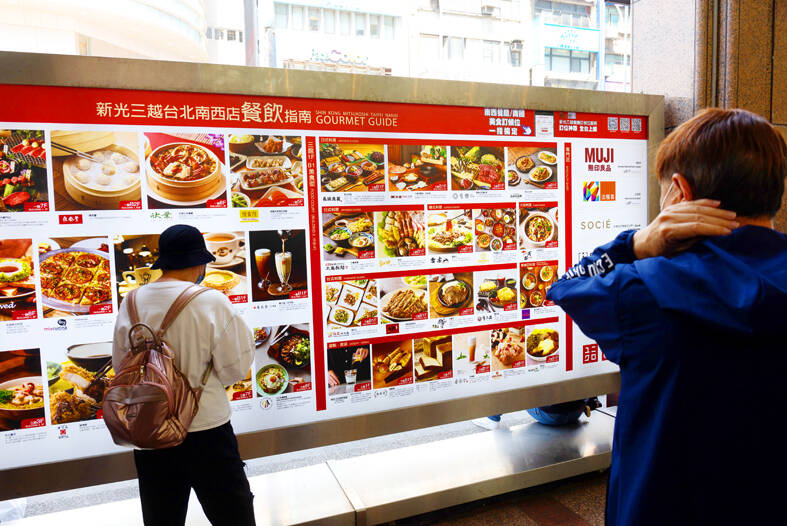Sales in the retail, and the food and beverage sectors this month are expected to retain their growth momentum, after sales last month hit the highest for the period on record, the Ministry of Economic Affairs said last week.
The ministry forecast that retail sales this month would benefit from Tomb Sweeping Day and Mother’s Day promotions, as well as the opening of new shopping malls, while food and beverage sales would be supported by the launch of new stores, products and items that help keep people cool in hot weather, the ministry said in a report on Wednesday.
Retail sales are predicted to increase 0.4 percent to 3.4 percent from April last year to between NT$388.8 billion and NT$400.4 billion (US$11.95 billion to US$12.31 billion) this month, while food and beverage sales are forecast to grow 2.2 to 5.2 percent to between NT$81.7 billion and NT$84.1 billion, the ministry said.

Photo: CNA
Last month, the retail sector’s sales were NT$393 billion, up 0.4 percent from a year earlier, driven mainly by stronger sales at e-commerce sites, supermarkets, convenience stores and hypermarkets, offsetting slowing consumption of vehicles, auto components and apparels, the report said.
While last month’s increase was slightly lower than the median of the ministry’s estimate from a 0.6 percent drop to a 2.4 percent gain, it was better than the annual decrease of 3.8 percent in February.
In the first three months of this year, retail sales rose 0.9 percent from a year earlier to a record NT$1.19 trillion, ministry data showed.
Sales in the food and beverage sector last month reached NT$85.5 billion, up 2.8 percent from a year earlier, which was also a significant improvement from the previous month’s 9.2 percent annual decline, and falls within the ministry’s estimate of 1.3 to 4.3 percent annual increase.
The ministry attributed the growth to new product launches, store expansions and joint promotions that benefited restaurants and beverage stores, while robust demand for in-flight meals also boosted sales of catering service providers, the report said.
In the first three months, food and beverage sales rose 3.7 percent year-on-year to NT$274 billion, also a record high for the same period, it said.
Meanwhile, sales generated by the wholesale sector last month increased 9.9 percent year-on-year to NT$1.18 trillion, also meeting the ministry’s forecast of an annual increase of 8 to 11 percent.
That was attributable to increases in demand for machinery equipment, pharmaceutical products, cosmetics and clothes, despite lackluster demand for cars and motorcycles, the report said.
In the first three months, the sector’s sales rose 9.2 percent year-on-year to NT$3.32 trillion, hitting the highest first-quarter sales ever, it said.
For this month, sales for the wholesale sector are projected to increase 4.3 to 7.3 percent year-on-year to between NT$1.1 trillion and NT$1.14 trillion, the ministry said.

The Eurovision Song Contest has seen a surge in punter interest at the bookmakers, becoming a major betting event, experts said ahead of last night’s giant glamfest in Basel. “Eurovision has quietly become one of the biggest betting events of the year,” said Tomi Huttunen, senior manager of the Online Computer Finland (OCS) betting and casino platform. Betting sites have long been used to gauge which way voters might be leaning ahead of the world’s biggest televised live music event. However, bookmakers highlight a huge increase in engagement in recent years — and this year in particular. “We’ve already passed 2023’s total activity and

Nvidia Corp CEO Jensen Huang (黃仁勳) today announced that his company has selected "Beitou Shilin" in Taipei for its new Taiwan office, called Nvidia Constellation, putting an end to months of speculation. Industry sources have said that the tech giant has been eyeing the Beitou Shilin Science Park as the site of its new overseas headquarters, and speculated that the new headquarters would be built on two plots of land designated as "T17" and "T18," which span 3.89 hectares in the park. "I think it's time for us to reveal one of the largest products we've ever built," Huang said near the

China yesterday announced anti-dumping duties as high as 74.9 percent on imports of polyoxymethylene (POM) copolymers, a type of engineering plastic, from Taiwan, the US, the EU and Japan. The Chinese Ministry of Commerce’s findings conclude a probe launched in May last year, shortly after the US sharply increased tariffs on Chinese electric vehicles, computer chips and other imports. POM copolymers can partially replace metals such as copper and zinc, and have various applications, including in auto parts, electronics and medical equipment, the Chinese ministry has said. In January, it said initial investigations had determined that dumping was taking place, and implemented preliminary

Intel Corp yesterday reinforced its determination to strengthen its partnerships with Taiwan’s ecosystem partners including original-electronic-manufacturing (OEM) companies such as Hon Hai Precision Industry Co (鴻海精密) and chipmaker United Microelectronics Corp (UMC, 聯電). “Tonight marks a new beginning. We renew our new partnership with Taiwan ecosystem,” Intel new chief executive officer Tan Lip-bu (陳立武) said at a dinner with representatives from the company’s local partners, celebrating the 40th anniversary of the US chip giant’s presence in Taiwan. Tan took the reins at Intel six weeks ago aiming to reform the chipmaker and revive its past glory. This is the first time Tan